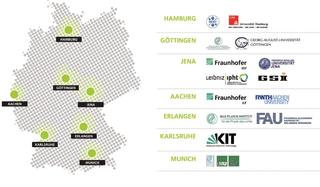Green light from politics for Max Planck School of Photonics
The Federal Ministry of Education and Research (BMBF) supports the installation of a new network of excellence in photonics. The Max Planck School of Photonics combines the competence of the German photonics community and supports high potentials among the younger scientists. This national network of excellence is led by the Fraunhofer Institute for Applied Optics and Precision Engineering (IOF) in Jena and aims to reach highest academic standards in photon science research comparable to Harvard or MIT.
The Max Planck School of Photonics is one of three (Max Planck School of Cognition und die Max Planck School on Physics, Chemistry and Construction of Life) chosen Max Planck Schools starting in a five year pilot phase. The schools bundle top-level scientists from universities and research institutions in national networks to recruit excellent graduates from all over the world for a doctoral program including fast track options. All academic grades will be awarded by the universities within the network.
Photonics has developed into a dynamic research discipline in the past years. Since turn of the millennium seven Nobel prizes were awarded to research with direct relation to optics including basic research and applications that fundamentally changed the society, e.g.: optical communication, digital photography and energy efficient environment-friendly light sources. Germany is one of the leading countries worldwide in photon science.
The network forming partners of the Max Planck School of Photonics teach and research at seven sites in Germany. With Hamburg, Göttingen, Aachen, Jena, Erlangen-Nuremberg, Munich and the Karlsruhe Institute of Technology they represent the excellence of photonics of the German universities. The four large research societies of Germany are represented too with the Fraunhofer Institutes for Applied Optics and Precision Engineering, for Laser Technology, the Max Planck Institutes for biophysical chemistry, for the Science of Light, for Quantum Optics, the Helmholtz Institutes Jena and DESY as well as the Leibniz Institute of Photonic Technology. From the University of Hamburg six professors are involved. They are DESY leading scientists Ralf Röhlsberger, Christian Schroer, Henry Chapman, Franz Kärtner, Nina Rohringer, and Robin Santra and the latter four are also group or division leaders within CFEL.
The aim of the consortium forming the Max Plank School of Photonics is to bring together the important and advanced communities of photonics to form an interdisciplinary network. The Federal Ministry of Education and Research grants financial support for the next five years with 15 million Euro and the Fraunhofer-Society added four million Euro.
Further information in English:
• MPG press release
• Interview with MPG vice president on the new Max Planck Schools
Further information in German:
• About MPSP (pdf)
• Fraunhofer Institute for Applied Optics & Precision Engineering (IOF) press release
• BMBF press release
